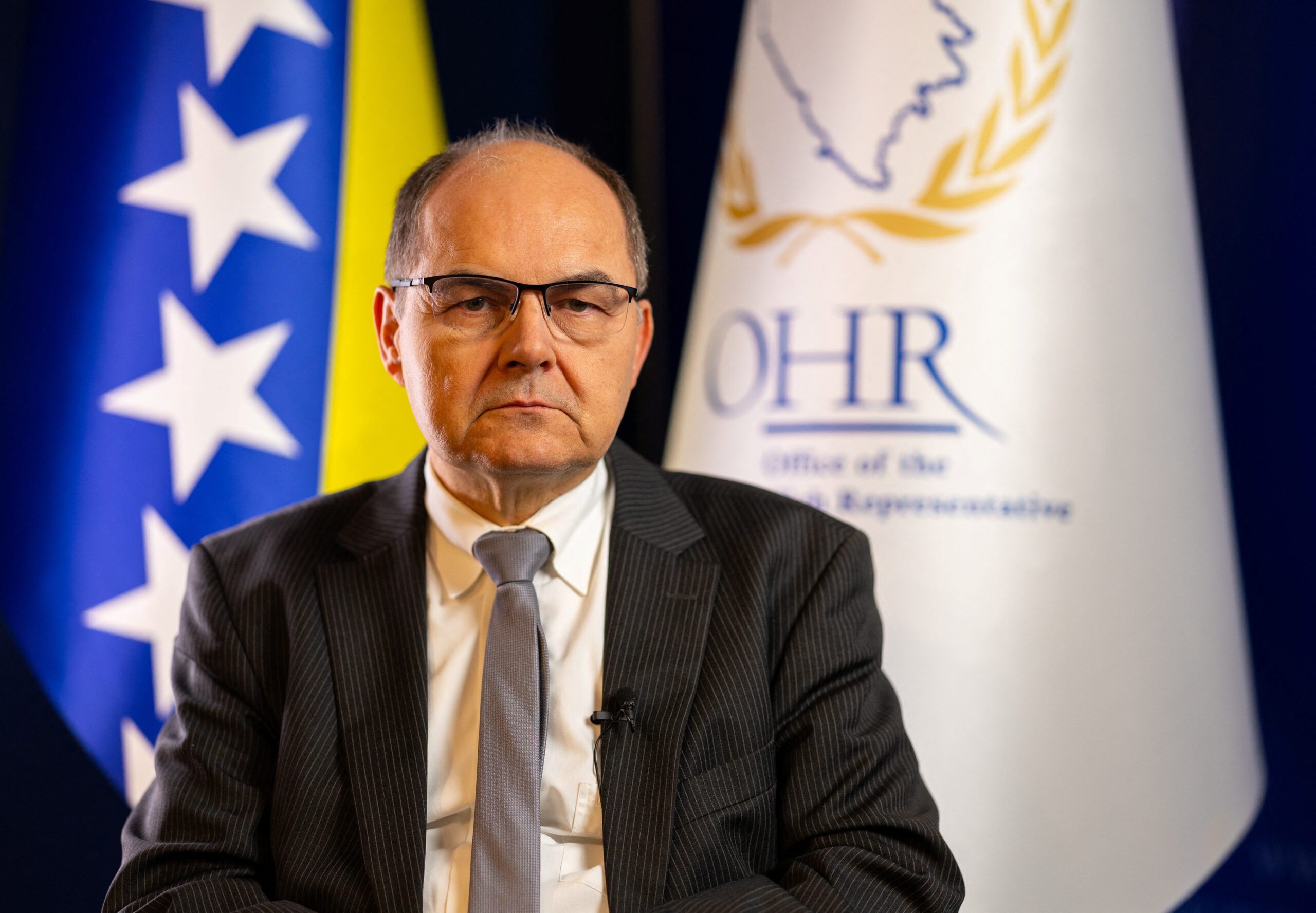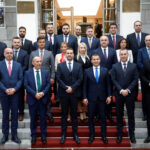High Representative Christian Schmidt submitted to the UN Secretary General his regular report on the developments related to the implementation of the General Framework Agreement for Peace in Bosnia and Herzegovina in the period between April 16 and October 15, 2023. As the last resort authority on action, the High Representative warned against unprecedented attacks on the Peace Agreement and the constitutional order of BiH, including the High Representative and the Constitutional Court of Bosnia and Herzegovina as their defenders. Of this attack, he accused the authorities of Republika Srpska, led by RS President Milorad Dodik. The High Representative strongly rejected misinterpretations of the Dayton Agreement voiced in RS that serve separatist purposes, including statements that deny the continuity of Bosnia and Herzegovina and distort its constitution. “The State of Bosnia and Herzegovina is not a union of states or a confederation. There is only one state on the territory of Bosnia and Herzegovina and that is Bosnia and Herzegovina itself,” the High Representative underlined, noting that the international community still has tools available to counter threats to the Peace Agreement. These tools need to be maintained and strengthened. The report also mentions steps taken to improve BiH’s institutional functionality and progress toward EU integration as positive achievements. The High Representative informed the UNSC members that violent attacks against returnees had increased over the reporting period and that corruption remained widespread. There are still many challenges in place related to adaptation to European and international standards, particularly in the areas of democracy, rule of law, economy, and social policy.
Željka Cvijanović, a member of the Presidium of BiH representing the Serbs, said that Christian Schmidt’s report is full of false and manipulative points, including accusations against Republika Srpska. “There is nothing critical in him not being the High Representative and having not achieved the required legitimacy or legality,” Cvijanovic said, noting that “Annex 10 to the Dayton Agreement clearly defines who can be the High Representative, and Schmidt was not approved by the Security Council by a corresponding resolution”.
BiH Presidium Chairman Željko Komšić, who personally arrived in New York, appealed to the UNSC, saying that the reason for this his appeal concerns the past six-month period presented in the report of the HR Office, with special emphasis on the facts shaping political developments in Bosnia and Herzegovina, as well as HR’s activities. In his speech, Komšić commended the extension of the mandate of the EUFOR Althea mission. He recalled that the legitimate purpose of the Dayton Agreement was to establish peace, but 28 years into its signing, BiH still has not completed the path of its democratic transition and remains trapped in the maelstrom of ethnically driven politics. The Dayton Peace became an instrument of various geopolitical contests between various actors in the geopolitical arena. Ethnic politics and ethnic groups are used to create tension and destabilize the situation. Despite the fact that there is a political debate in BiH about whether the High Representative is legitimate, Komšić supported the very existence of the OHR. As for his specific report, he highlighted here that the current High Representative was the first to face mass protests by BiH citizens. There are some OHR decisions that are good and aimed at protecting the constitutional order in BiH but they were insufficient and unclear. There is a great disparity between the attitude toward the behavior of the actors from Republika Srpska, in which they talk about a supposedly peaceful disengagement, a peaceful dissolution, and whether the weak reaction of the High Representative is caused by insufficient capacity or lack of support from the international community. There is an appreciation of the High Representative’s efforts when blockages emerge targeting state institutions, where he tried to resolve these blockages through mediation. However, the actions of the incumbent High Representative do not always serve mediation purposes, as required by Annex 10 to the Dayton Peace Agreement. With respect to the Federation of Bosnia and Herzegovina, they are defined as proactive, while with Republika Srpska – as reactive. Such different attitudes put the High Representative in a very difficult position.
In his speech, Komšić noted that he was concerned by the behavior of Prime Minister Andrej Plenković, by Croatia lobbying that the High Representative introduce such changes to the constitution and the Law on Elections of Bosnia and Herzegovina, which correspond to the political interests of the neighboring country, and affect BiH sovereignty.
Komšić also emphasized that the High Representative demonstrated his bias by allowing the formation of a new government in BiH despite the election outcome, suspending the Constitution for 24 hours. It was an unprecedented attack on rule of law in BiH. He expressed concern about the High Representative’s efforts to solve the issue of state property in a strange way. Schmidt’s ideas about state property differ from the practice and environment in BiH, because property is not territory, and territory is not property, according to the head of the BiH Presidium.
Meanwhile, concluding his address, Komšić reaffirmed support for the very existence of the OHR and called on the international community to cooperate with it.
Thus, the High Representative did not fly to New York to present the report in person, but the head of the BiH Presidium did go there and rather critically assessed HR’s activities over the reporting period. Obviously, the High Representative was expecting such a sharp speech, so he thought it best to simply hand over the report to the UNSC member states. Actually, Russia launched a narrative about his supposed illegitimacy, so Moscow, had Schmidt attended the meeting, would have tried to develop this topic during the debate.
Schmidt opened several fronts of infighting in Bosnia and Herzegovina, and the provocative moves by the RS President regarding the non-recognition of HR’s powers and the open struggle for the secession of RS from Bosnia and Herzegovina is not the only problem that the OHR is facing. Komšić publicly expressed his discontent with Schmidt’s activities in his position, which hurts his authority among the UNSC member states. Perhaps the High Representative could have been more decisive in the fight against the unconcealed separatism on the part of Milorad Dodik but there are more conflicts developing with other political camps in BiH, which significantly narrows his maneuverability in his post.
The meeting of the UN Security Council heard some sharp statements. After the head of the BiH Presidium directly accused the Prime Minister of Croatia, Croatian Ambassador to the UN Ivan Šimonović reacted: “Regarding the presence of Mr. Komšić at the meeting and his conclusions, I would like to note that Croatia does not recognize him as a legitimate member of the Presidium of Bosnia and Herzegovina”. He added that Komšić `got the position of a member of the Presidium because of “ethnic engineering.” “We sincerely hope that changes to the electoral legislation will make such manipulations impossible in the future,” he said. After that, BiH Ambassador to the UN, Zlatko Lagumdzija, said he considered unacceptable the statement by the head of the Croatian diplomatic mission.
Thus, Moscow and Milorad Dodik declare that Karl Schmidt is illegitimate in his current position, Komšić sharply criticizes the High Representative but does not consider his appointment controversial, while Croatia supports HR’s activities in BiH but declares illegitimacy of Komšić himself as he had allegedly become a representative of the Croatian people in the BiH Presidium in a rather dubious way. At the same time, speaking about the address by BiH Presidium Chairman at the UNSC meeting, BiH Presidium member Željka Cvijanović said his appeal had not been approved by all members of the Presidium.
The only conclusion for all those who watched the event in New York is that the situation in BiH remains really tense and problematic. There are many objective factors and issues of a subjective nature, connected with the personal confrontation between the country’s political leaders, who relay the vision not only of their supporters, but also of a part of the voters, which brings a major disorder to the operations of state authorities.



